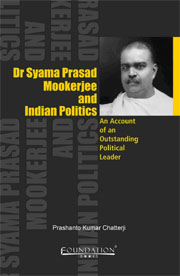Book contents
- Frontmatter
- Contents
- Preface
- 1 Dr Syama Prasad Mookerjee as the Finance Minister of Bengal, 1941–1942
- 2 Syama Prasad and Hindu Mahasabha's Ascendancy in Indian Politics, 1938–1944
- 3 Syama Prasad and Hindu Mahasabha's Transitory Resuscitation after Reverses, 1945–1947
- 4 Syama Prasad's Achievements as the Central Cabinet Minister, 1947–1950
- 5 Syama Prasad and Establishment of Bharatiya Jana Sangh, 1950–1953
- 6 Conclusion
- Appendix I
- Appendix II
- Appendix III
- Appendix IV
- Appendix V
- Appendix VI
- Appendix VII
- Bibliography
- Index
Appendix IV
Published online by Cambridge University Press: 05 February 2012
- Frontmatter
- Contents
- Preface
- 1 Dr Syama Prasad Mookerjee as the Finance Minister of Bengal, 1941–1942
- 2 Syama Prasad and Hindu Mahasabha's Ascendancy in Indian Politics, 1938–1944
- 3 Syama Prasad and Hindu Mahasabha's Transitory Resuscitation after Reverses, 1945–1947
- 4 Syama Prasad's Achievements as the Central Cabinet Minister, 1947–1950
- 5 Syama Prasad and Establishment of Bharatiya Jana Sangh, 1950–1953
- 6 Conclusion
- Appendix I
- Appendix II
- Appendix III
- Appendix IV
- Appendix V
- Appendix VI
- Appendix VII
- Bibliography
- Index
Summary
Indian Legislative Assembly Debates, Vol. 8 (1946) pp. 1053–55
Jawaharlal Nehru on the Communal Riots, 14 November 1946
To give an account of the communal trouble in the country is to deal with a chain of events going back to the past. One evil action leads to another which again becomes the ostensible cause of further evil. The preaching and practice of hatred and violence inevitably sows seeds which yield bitter fruit. If we sow the wind we have to reap the whirlwind.
Ever since the Interim Government took charge of affairs they have been intensely occupied with these communal troubles. The House will remember that this Government took office very soon after what is called the great Calcutta killing which began on the 16th August. All our work was shadowed by these events and we tried our utmost to deal with this situation. The House knows that the Government of India may not interfere, under the existing constitution, with the Provincial autonomy. In so far as any one can interfere under the constitution, it is the Governor- General, and not the Governor-General in Council. Nevertheless, as Indians in responsible positions to whom the country looked for guidance, we tried our utmost to help. Throughout this unhappy period, whether it was in Calcutta or elsewhere in India, or Noakhali and East Bengal, or Bihar, the Government were acutely conscious of their responsibilities and keenly desirous of combating the peril that had encompassed the country. and keenly desirous of combating the peril that had encompassed the country.
- Type
- Chapter
- Information
- Dr Syama Prasad Mookerjee and Indian PoliticsAn Account of an Outstanding Political Leader, pp. 356 - 359Publisher: Foundation BooksPrint publication year: 2010

